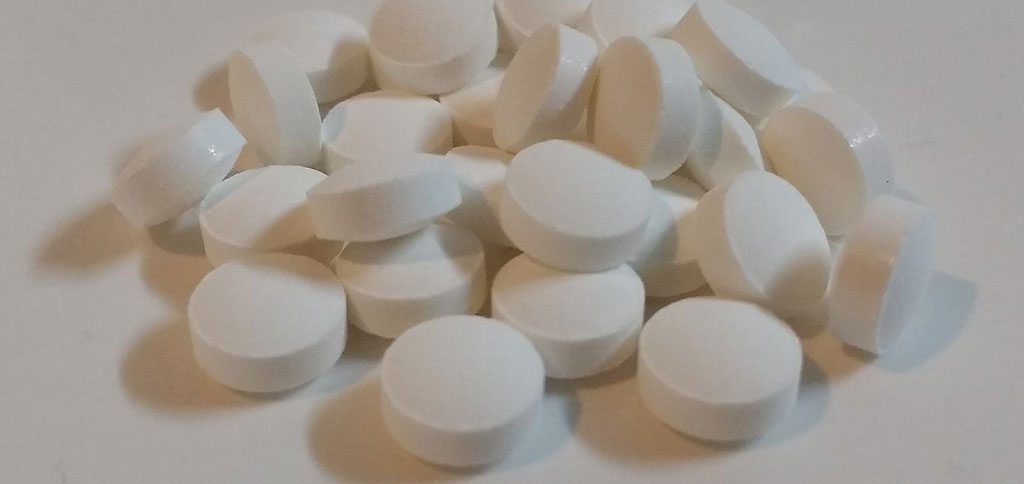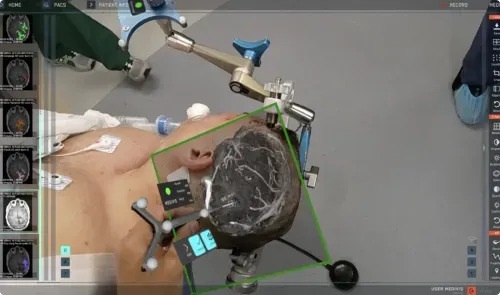New Study Provides Encouraging Results on Use of Ivermectin for Reducing Viral Transmission in Patients with Mild COVID-19
|
By HospiMedica International staff writers Posted on 20 Jan 2021 |

Image: New Study Provides Encouraging Results on Use of Ivermectin for Reducing Viral Transmission in Patients with Mild COVID-19 (Photo courtesy of Mx. Granger)
A small pilot study suggests that early administration of ivermectin can reduce viral loads and symptom duration in patients with mild COVID-19, which in turn could help reduce viral transmission.
The study, led by the University of Navarra Clinic (Pamplona, Spain) and the Barcelona Institute for Global Health (ISGlobal; Barcelona, Spain), warrants further exploration in larger clinical trials. Ivermectin is an antiparasitic drug that has been shown to reduce SARS-CoV-2 replication in vitro (in cell lines), albeit at concentrations that exceed those recommended for human use. This, together with preliminary results from a trial in humans that used data of dubious origin and was never peer-reviewed, prompted the use of ivermectin in many Latin-American countries despite the lack of reliable evidence on its efficacy in treating or preventing infection.
In the pilot study performed with COVID-19 patients, the team evaluated whether the maximal dose of ivermectin recommended in Europe could have an impact on viral transmission when administered within the first days after symptom onset. The research team gave one single dose of ivermectin or placebo to 24 patients with confirmed infection and mild symptoms, within the first 72 hours after the first symptoms started. Nasal swabs and blood samples were taken at the moment of enrolment and one, two and/or three weeks after treatment. Seven days after treatments, no difference was observed in the percentage of PCR-positive patients (100% of patients were positive in both groups).
However, the mean viral load in the ivermectin-treated group was lower (around 3x lower at four days and up to 18x lower at seven days post-treatment), although the difference was not statistically significant. Treated patients also showed a reduced duration of certain symptoms (of 50% for loss of smell and taste and of 30% for cough). All patients developed virus-specific IgG but, again, the mean level of antibodies in the treated group was lower than in the placebo group. The fact that there was no effect on duration of symptoms or makers associated with inflammation suggests that ivermectin may act through mechanisms that do not involve a possible anti-inflammatory effect. The researchers believe it could be interfering with viral entry in the cells, as suggested by another study performed in hamsters.
“Many efforts are focusing on developing treatments for COVID-19, but few are addressing how to reduce viral transmission,” said study coordinator Carlos Chaccour, researcher at ISGlobal and physician at the University of Navarra Clinic. “Our findings are in line with those from recent assays conducted in Bangladesh and Argentina. Although our study is small and it is too early to draw conclusions, the trends observed in viral loads, symptom duration and antibody levels are encouraging and warrant further exploration in larger clinical trials with a higher diversity of patients.”
Related Links:
University of Navarra Clinic
Barcelona Institute for Global Health
The study, led by the University of Navarra Clinic (Pamplona, Spain) and the Barcelona Institute for Global Health (ISGlobal; Barcelona, Spain), warrants further exploration in larger clinical trials. Ivermectin is an antiparasitic drug that has been shown to reduce SARS-CoV-2 replication in vitro (in cell lines), albeit at concentrations that exceed those recommended for human use. This, together with preliminary results from a trial in humans that used data of dubious origin and was never peer-reviewed, prompted the use of ivermectin in many Latin-American countries despite the lack of reliable evidence on its efficacy in treating or preventing infection.
In the pilot study performed with COVID-19 patients, the team evaluated whether the maximal dose of ivermectin recommended in Europe could have an impact on viral transmission when administered within the first days after symptom onset. The research team gave one single dose of ivermectin or placebo to 24 patients with confirmed infection and mild symptoms, within the first 72 hours after the first symptoms started. Nasal swabs and blood samples were taken at the moment of enrolment and one, two and/or three weeks after treatment. Seven days after treatments, no difference was observed in the percentage of PCR-positive patients (100% of patients were positive in both groups).
However, the mean viral load in the ivermectin-treated group was lower (around 3x lower at four days and up to 18x lower at seven days post-treatment), although the difference was not statistically significant. Treated patients also showed a reduced duration of certain symptoms (of 50% for loss of smell and taste and of 30% for cough). All patients developed virus-specific IgG but, again, the mean level of antibodies in the treated group was lower than in the placebo group. The fact that there was no effect on duration of symptoms or makers associated with inflammation suggests that ivermectin may act through mechanisms that do not involve a possible anti-inflammatory effect. The researchers believe it could be interfering with viral entry in the cells, as suggested by another study performed in hamsters.
“Many efforts are focusing on developing treatments for COVID-19, but few are addressing how to reduce viral transmission,” said study coordinator Carlos Chaccour, researcher at ISGlobal and physician at the University of Navarra Clinic. “Our findings are in line with those from recent assays conducted in Bangladesh and Argentina. Although our study is small and it is too early to draw conclusions, the trends observed in viral loads, symptom duration and antibody levels are encouraging and warrant further exploration in larger clinical trials with a higher diversity of patients.”
Related Links:
University of Navarra Clinic
Barcelona Institute for Global Health
Latest COVID-19 News
- Low-Cost System Detects SARS-CoV-2 Virus in Hospital Air Using High-Tech Bubbles
- World's First Inhalable COVID-19 Vaccine Approved in China
- COVID-19 Vaccine Patch Fights SARS-CoV-2 Variants Better than Needles
- Blood Viscosity Testing Can Predict Risk of Death in Hospitalized COVID-19 Patients
- ‘Covid Computer’ Uses AI to Detect COVID-19 from Chest CT Scans
- MRI Lung-Imaging Technique Shows Cause of Long-COVID Symptoms
- Chest CT Scans of COVID-19 Patients Could Help Distinguish Between SARS-CoV-2 Variants
- Specialized MRI Detects Lung Abnormalities in Non-Hospitalized Long COVID Patients
- AI Algorithm Identifies Hospitalized Patients at Highest Risk of Dying From COVID-19
- Sweat Sensor Detects Key Biomarkers That Provide Early Warning of COVID-19 and Flu
- Study Assesses Impact of COVID-19 on Ventilation/Perfusion Scintigraphy
- CT Imaging Study Finds Vaccination Reduces Risk of COVID-19 Associated Pulmonary Embolism
- Third Day in Hospital a ‘Tipping Point’ in Severity of COVID-19 Pneumonia
- Longer Interval Between COVID-19 Vaccines Generates Up to Nine Times as Many Antibodies
- AI Model for Monitoring COVID-19 Predicts Mortality Within First 30 Days of Admission
- AI Predicts COVID Prognosis at Near-Expert Level Based Off CT Scans
Channels
Artificial Intelligence
view channel
AI-Powered Algorithm to Revolutionize Detection of Atrial Fibrillation
Atrial fibrillation (AFib), a condition characterized by an irregular and often rapid heart rate, is linked to increased risks of stroke and heart failure. This is because the irregular heartbeat in AFib... Read more
AI Diagnostic Tool Accurately Detects Valvular Disorders Often Missed by Doctors
Doctors generally use stethoscopes to listen for the characteristic lub-dub sounds made by heart valves opening and closing. They also listen for less prominent sounds that indicate problems with these valves.... Read moreCritical Care
view channel.jpeg)
Transcatheter Valve Replacement Outcomes Similar To Surgery, Finds Study
A new study has shown that a minimally invasive procedure for replacing the aortic valve in the heart—known as transcatheter aortic valve replacement (TAVR)—is on par with the more traditional surgical... Read more
Revascularization Improves Life Quality in Chronic Limb-Threatening Ischemia, Finds Study
Researchers have undertaken a detailed study to evaluate the effects of revascularization strategies on the health-related quality of life (HRQoL) of patients with chronic limb-threatening ischemia.... Read moreSurgical Techniques
view channel
AR Surgical Technology Translates Complex 2D Medical Imaging to Enhance Accuracy
Surgeons often have to switch their focus between a patient’s data displayed on a screen or clipboard and the patient themselves during procedures. But that is about to change. Surgeons can now utilize... Read more
Miniaturized Snake-Like Probe Images Cerebral Arteries From Within
Endovascular interventions are being increasingly favored for treating strokes and cerebral artery diseases, but rely heavily on angiographical imaging that often struggles with limited contrast and spatial... Read morePatient Care
view channelFirst-Of-Its-Kind Portable Germicidal Light Technology Disinfects High-Touch Clinical Surfaces in Seconds
Reducing healthcare-acquired infections (HAIs) remains a pressing issue within global healthcare systems. In the United States alone, 1.7 million patients contract HAIs annually, leading to approximately... Read more
Surgical Capacity Optimization Solution Helps Hospitals Boost OR Utilization
An innovative solution has the capability to transform surgical capacity utilization by targeting the root cause of surgical block time inefficiencies. Fujitsu Limited’s (Tokyo, Japan) Surgical Capacity... Read more
Game-Changing Innovation in Surgical Instrument Sterilization Significantly Improves OR Throughput
A groundbreaking innovation enables hospitals to significantly improve instrument processing time and throughput in operating rooms (ORs) and sterile processing departments. Turbett Surgical, Inc.... Read moreHealth IT
view channel
Machine Learning Model Improves Mortality Risk Prediction for Cardiac Surgery Patients
Machine learning algorithms have been deployed to create predictive models in various medical fields, with some demonstrating improved outcomes compared to their standard-of-care counterparts.... Read more
Strategic Collaboration to Develop and Integrate Generative AI into Healthcare
Top industry experts have underscored the immediate requirement for healthcare systems and hospitals to respond to severe cost and margin pressures. Close to half of U.S. hospitals ended 2022 in the red... Read more
AI-Enabled Operating Rooms Solution Helps Hospitals Maximize Utilization and Unlock Capacity
For healthcare organizations, optimizing operating room (OR) utilization during prime time hours is a complex challenge. Surgeons and clinics face difficulties in finding available slots for booking cases,... Read more
AI Predicts Pancreatic Cancer Three Years before Diagnosis from Patients’ Medical Records
Screening for common cancers like breast, cervix, and prostate cancer relies on relatively simple and highly effective techniques, such as mammograms, Pap smears, and blood tests. These methods have revolutionized... Read morePoint of Care
view channel
Critical Bleeding Management System to Help Hospitals Further Standardize Viscoelastic Testing
Surgical procedures are often accompanied by significant blood loss and the subsequent high likelihood of the need for allogeneic blood transfusions. These transfusions, while critical, are linked to various... Read more
Point of Care HIV Test Enables Early Infection Diagnosis for Infants
Early diagnosis and initiation of treatment are crucial for the survival of infants infected with HIV (human immunodeficiency virus). Without treatment, approximately 50% of infants who acquire HIV during... Read more
Whole Blood Rapid Test Aids Assessment of Concussion at Patient's Bedside
In the United States annually, approximately five million individuals seek emergency department care for traumatic brain injuries (TBIs), yet over half of those suspecting a concussion may never get it checked.... Read more
New Generation Glucose Hospital Meter System Ensures Accurate, Interference-Free and Safe Use
A new generation glucose hospital meter system now comes with several features that make hospital glucose testing easier and more secure while continuing to offer accuracy, freedom from interference, and... Read moreBusiness
view channel
Johnson & Johnson Acquires Cardiovascular Medical Device Company Shockwave Medical
Johnson & Johnson (New Brunswick, N.J., USA) and Shockwave Medical (Santa Clara, CA, USA) have entered into a definitive agreement under which Johnson & Johnson will acquire all of Shockwave’s... Read more



















